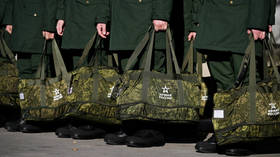EU sets new military spending record
Despite the increase, the EU’s top diplomat warned that the bloc continues “to lag behind other players” in defense spending
Military spending in the European Union increased by 6% to a record €240 billion ($261.4 billion) in 2022, according to figures published on Thursday by the European Defense Agency.
Some 20 of the EU’s 28 member states increased their defense budgets last year, with six countries implementing hikes of more than 10%. Sweden – which applied to join NATO last July – led the pack with an increase of 30%, the tiny kingdom of Luxembourg followed at 28%, the vocally anti-Russia government of Lithuania boosted spending by 27.6%, and Spain’s ruling socialists oversaw an increase of 19%.
In total, 1.5% of the bloc’s GDP was spent on defense last year. Some 22 EU members are also members of NATO, yet only five – Estonia, Greece, Latvia, Lithuania, and Poland – met the bloc’s requirement that they spend 2% of their GDP on their militaries. Hungary, Romania, Slovakia, and Finland joined these five in passing the 2% threshold this year.
A record €58 billion ($68.1 billion) was allocated to defense investments and weapons procurement across the bloc, up 6% from 2021. German Chancellor Olaf Scholz vowed last March to spend almost double this amount on his country’s military in a one-off cash injection, but as of this February, less than a third of the lump sum had been assigned to contracts.
The EU’s combined military budget is still dwarfed by that of the US, which spent $752.9 billion on defense in 2022, increasing that figure to $816.7 billion this year, or around 3.5% of GDP.
Despite spending more on defense than ever before, the EU is struggling to arm its own soldiers and Ukraine. Member states committed in March to the joint supply of a million artillery shells to Kiev’s forces by March 2024, but only a third of that number has been supplied, and German Defense Minister Boris Pistorius told reporters last month that “the one million target will not be reached.”
Meanwhile, media reports suggest that the German armed forces would have enough ammunition for two days of full-scale war, while NATO logistics chief Alexander Sollfrank warned last month that bureaucratic hurdles and inadequate infrastructure would prevent NATO forces from easily getting to the frontline in the event of war with Russia.
The EU’s top diplomat, Josep Borrell, stated in mid-2022 that all of the bloc’s militaries combined would “run out of ammo in two weeks” if they had to fight a conflict as intense as the one in Ukraine.
Borrell, who also heads the European Defense Agency, welcomed Thursday’s report, but warned that the EU continues to “lag behind other global players in spending.”
You can share this story on social media:








Comments are closed.